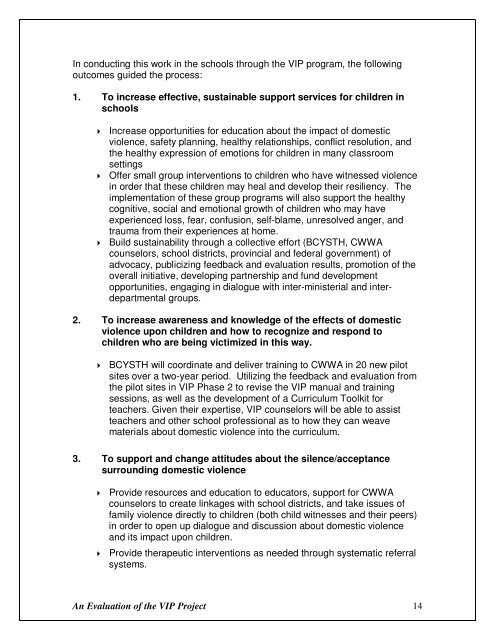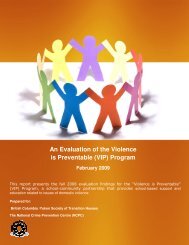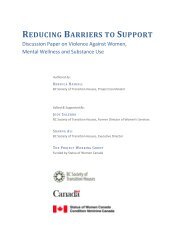An Evaluation of the VIP Program (2007-2008 - BC Society of ...
An Evaluation of the VIP Program (2007-2008 - BC Society of ...
An Evaluation of the VIP Program (2007-2008 - BC Society of ...
You also want an ePaper? Increase the reach of your titles
YUMPU automatically turns print PDFs into web optimized ePapers that Google loves.
In conducting this work in <strong>the</strong> schools through <strong>the</strong> <strong>VIP</strong> program, <strong>the</strong> following<br />
outcomes guided <strong>the</strong> process:<br />
1. To increase effective, sustainable support services for children in<br />
schools<br />
Increase opportunities for education about <strong>the</strong> impact <strong>of</strong> domestic<br />
violence, safety planning, healthy relationships, conflict resolution, and<br />
<strong>the</strong> healthy expression <strong>of</strong> emotions for children in many classroom<br />
settings<br />
Offer small group interventions to children who have witnessed violence<br />
in order that <strong>the</strong>se children may heal and develop <strong>the</strong>ir resiliency. The<br />
implementation <strong>of</strong> <strong>the</strong>se group programs will also support <strong>the</strong> healthy<br />
cognitive, social and emotional growth <strong>of</strong> children who may have<br />
experienced loss, fear, confusion, self-blame, unresolved anger, and<br />
trauma from <strong>the</strong>ir experiences at home.<br />
Build sustainability through a collective effort (<strong>BC</strong>YSTH, CWWA<br />
counselors, school districts, provincial and federal government) <strong>of</strong><br />
advocacy, publicizing feedback and evaluation results, promotion <strong>of</strong> <strong>the</strong><br />
overall initiative, developing partnership and fund development<br />
opportunities, engaging in dialogue with inter-ministerial and interdepartmental<br />
groups.<br />
2. To increase awareness and knowledge <strong>of</strong> <strong>the</strong> effects <strong>of</strong> domestic<br />
violence upon children and how to recognize and respond to<br />
children who are being victimized in this way.<br />
<strong>BC</strong>YSTH will coordinate and deliver training to CWWA in 20 new pilot<br />
sites over a two-year period. Utilizing <strong>the</strong> feedback and evaluation from<br />
<strong>the</strong> pilot sites in <strong>VIP</strong> Phase 2 to revise <strong>the</strong> <strong>VIP</strong> manual and training<br />
sessions, as well as <strong>the</strong> development <strong>of</strong> a Curriculum Toolkit for<br />
teachers. Given <strong>the</strong>ir expertise, <strong>VIP</strong> counselors will be able to assist<br />
teachers and o<strong>the</strong>r school pr<strong>of</strong>essional as to how <strong>the</strong>y can weave<br />
materials about domestic violence into <strong>the</strong> curriculum.<br />
3. To support and change attitudes about <strong>the</strong> silence/acceptance<br />
surrounding domestic violence<br />
Provide resources and education to educators, support for CWWA<br />
counselors to create linkages with school districts, and take issues <strong>of</strong><br />
family violence directly to children (both child witnesses and <strong>the</strong>ir peers)<br />
in order to open up dialogue and discussion about domestic violence<br />
and its impact upon children.<br />
Provide <strong>the</strong>rapeutic interventions as needed through systematic referral<br />
systems.<br />
<strong>An</strong> <strong>Evaluation</strong> <strong>of</strong> <strong>the</strong> <strong>VIP</strong> Project 14






